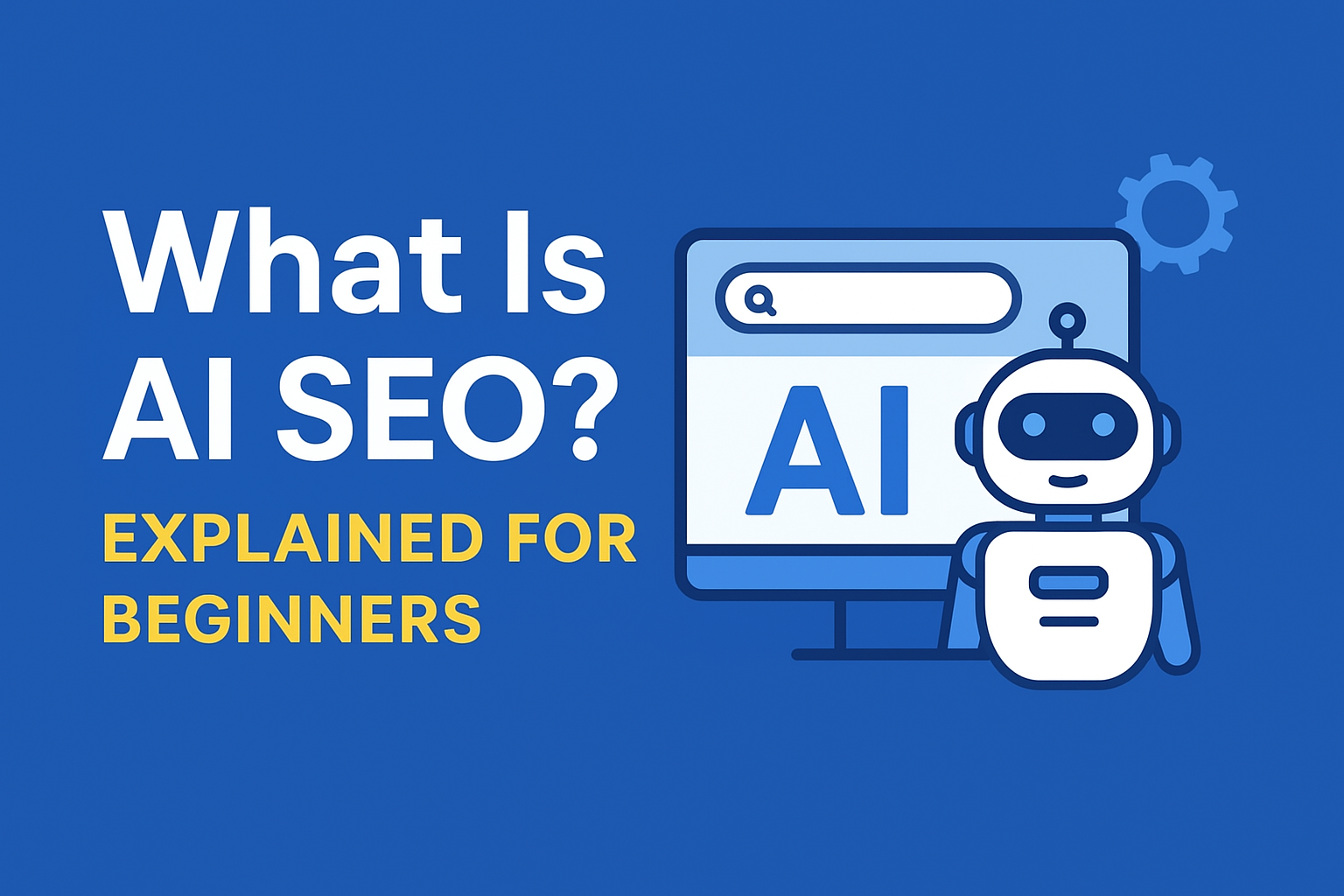The speed at which search engines are evolving is quite unmatched. With the advent of AI-powered models such as Google Search Generative Experience (SGE), ChatGPT, Perplexity, and Bing Copilot, traditional SEO has become insufficient to remain competitive. Today, users demand instant conversational answers, an operation that AI-powered search engines are rendering possible. This calls for a total change in how content creators and businesses approach search engine optimization. The new age of AI SEO services seeks to optimize content for not just Google but also such models of search powered by artificial intelligence, even with the concept of How AI helps in keyword research all explained by Tech Alphonic with their proven strategies.
What Are AI SEO Services?
AI SEO is optimizing your site and content for comprehension, evaluation, and ranking by artificial intelligence–based search engines. Differently from traditional SEO, which primarily depended on keyword placement and backlinks, modern AI SEO services are more around the intent, semantics, user behavior, contextual meaning, and topic relationships high up in the levels.
AI SEO is the understanding of context and meaning instead of fixing attention on keywords.
No longer blindly matching keywords, modern search engines interpret the entire sense of a page. The intent behind each query can be much deeper, with needs for covering related and broader subtopics according to synonyms and contextual ideas.
AI SEO connects your content to AI-generated answers across platforms.
Google SGE, for instance, answers within the search results. So do ChatGPT and Perplexity. All three reference credible sources while generating their output, and the more comprehensive and structured your content is, the better chance you have of being pulled in as a trusted reference.
AI SEO enhances user satisfaction with clarity, depth, and helpfulness.
That’s right; AI models will also measure your write-up based on the standard of readiness and domain expertise. When the material content is complete and accurate in the information it delivers, ranking becomes easy.
AI SEO vs Traditional SEO — Difference
The Difference of AI SEO vs Traditional SEO is, indeed, important for adapting to the future of digital marketing. Below is a deep dive breakdown.
1. Intent and meaning are the focus of AI SEO; keywords are traditional.
Traditionally, they highly depended on keywords to repeat and signal relevance. The full semantic relationship will be looked upon by AI. Those queries have a lot of context; thus, instead of writing on “SEO,” you should instead provide reasons why someone would find it relevant.
2. Traditional SEO is for Google SERPs only; AI SEO is for all.
An old SEO strategy focused on Google’s top 10 results. That is it; the scope widened because the AI SEO company in India, like Tech Alphonic, takes you beyond:
- Google SGE answer
- ChatGPT citations
- Perplexity responses
- Bing AI answers
Knowledge panels in addition to rich snippets—this multiplies where your traffic sources are coming from.
3. Traditional SEO is fixed in algorithms; AI SEO is responsive to the changes brought about by machine learning.
Historically, Google used formulaic bases for ranking. But nowadays, with AI, those systems learn continuously according to user behavior, which makes rankings always dynamic. These necessitate AI SEO adaptation.
4. Traditional SEO focused on metadata; AI SEO focuses on content experience.
Old strategies tended to put the most emphasis on meta tags and technical optimization in general. AI SEO focuses more on:
- The depth of topics
- Logical formatting
- Clear explanations
- High-quality authority Because AI models read through your content like a human being.
5. Traditional SEO ranks content with keywords; AI SEO ranks content with semantic clusters.
AI analyzes related terms and subtopics. It must include all variations, questions, and synonyms to truly meet all user needs.
How To Optimize Content for AI Search (SGE)
To make it to AI-driven search results, the content must fulfill the requirements upon which Google has based its Search Generative Experience (SGE).
1. Produce well-researched, long-form, second-to-none content.
SGE wants to give the best possible answers, which means that the content it cites must be detailed, accurate, and comprehensive; anything else is dismissed.
2. Think semantic SEO and give thorough treatment to every related theme.
Semantic SEO is concerned with entities, subtopics, and related inquiries; the more exhaustive the treatment of a topic, the better the AI can understand the context of your page.
3. Use a natural, conversational style.
AI SEO company in India do not like content that looks machine-generated, so they prefer to write in a human-like way. Short sentences and basic vocabulary words, along with direct answers, increase your ranking prospects.
4. Attend to formatting (H2, H3, bullets, FAQ).
AI systems pick answers from organized content. Structure helps AI traverse your page comfortably and select relevant sections.
5. Provide up-to-date information, statistics, and references.
SGE is assigning greater weight to the newly updated content. Any sort of old information tends to get less weightage.
6. Employ schema markup for better AI recognition.
FAQ schema and How to schema would help Artificial Intelligence know how the page is laid out.
How AI Helps in Keyword Research
Keyword research has radically changed with the help of artificial intelligence. Rather than spending tedious hours manually looking into keywords, AI automates and enhances the entire process.
1. AI predicts search trends even before they peak.
Machine learning evaluates millions of searches for signs of rising topics at an early stage. This allows you to create the content before any other competitors.
2. Use semantic SEO to cover every related topic.
The tools can generate hundreds of variations from informational to transactional queries, which include “how,” “what,” “why,” and “best.” Those are heavily utilized in AI-generated answers.
3. AI will put keywords into semantic clusters.
AI creates sets of keywords that really define topical clusters; this would greatly impart topical authority in the eyes of AI-based ranking systems.
4. AI identifies keyword gaps where your competitors rank.
This helps you discover opportunities that you missed, giving you topics to cover that can drive traffic directly.
5. AI analyzes user intent behind keywords.
Each keyword would be classified as
- Informational
- Navigational
- Transactional
- Comparative
Local intent This guarantees that your content fits the user’s need perfectly.
How to Rank on ChatGPT & Perplexity
The more citation material sets are in ChatGPT and Perplexity, the more trustworthy the hereby cited expertise should be assumed to be.
1. Publish authoritative, research-rich, expert content.
Citations increase trust through data, examples, and statistics, as well as firsthand insights.
2. Gain topical authority through depth on given topics.
The more often the site gets to post on a specific topic, the more it conditions this AI system for its knowledge and the orientation it takes toward its citation.
3. Use clear headings, Q&A sections, and defined explanations.
Adequate heading structure is supposed to incorporate a Q&A section craftily written with lucid explanations.
4. Write with clarity and simplicity.
ChatGPT and Perplexity need their query result like that, thus maybe increasing the chance of citation.
5. Update your content frequently.
AI does not stay vague, technical, or confused; lucidity triumphs!
Uphold the trend of frequently updating outdated content.
Citation weighting for freshness is gently given by the AI including Perplexity, on new information from the source, which provides the strategies on how to rank on Chatgpt & perplexity.
Best AI SEO tools in 2025
These stand as the ten best tools from the AI SEO company in India, like Tech Alphonic, among the hundreds showered with love recently.
1. Surfer AI—Best for page optimization.
Surfer analyzes the best-ranking pages and recommends the keyword density, content length, and semantic terms to be used in input and drafts by artificial intelligence.
2. Ahrefs AI Assistant—The best for competing keywords & backlinked data.
It helps in the automatic generation of insights into gaps in keywords, new content ideas, and possibilities for link building.
3. SEMrush Copilot—A full library of an AI SEO workflow tool.
This is a complete automation and streamlining of all SEO processes from content planning to optimization.
4. Jasper SEO Mode—AI writing with SEO intelligence.
Jasper is writing content itself, titles, meta-descriptions, and keyword-rich outlines.
5. Frase.io—Perfect for optimizing content briefs.
Frase is a tool that identifies the most relevant questions asked by the users and helps you shape your content to get ranked.
6. MarketMuse—Grows topical authority.
It suggests topics, outlines, and keyword clusters in order for you to develop strong domain authority with the best AI SEO tools in 2025.
7. Clearscope AI—Beyond great readability and richness in keywords.
Clearscope grades your content with respect to clarity, depth, and semantic fullness.
8. The Perplexity Pro- For in-depth research and well-researched writing.
This serves up citations together with insights, fact-checked information, and content creation at an expert level.
The New Era of AI-Driven Search
AI SEO exists in practice today and will be relevant in the future. AI-backed searches will begin to redefine how people search for information on the web, and thus businesses will have to stray from traditional SEO and delve into AI-centric optimization strategies. Knowing how to distinguish between AI SEO services and conventional SEO services, perform content optimization for AI searches (SGE), conduct the keyword research stoutly with AI, rank brilliantly on ChatGPT and Perplexity, and utilize the best 2025 AI SEO tools will give your brand an overly undeserved advantage in gaining enduring visibility over others.
AI SEO provides communication avenues for audiences through so many channels, not limited to search engines but flooding your presence with unprecedented online traffic.
FAQs
1: What is AI SEO? How does it differ from traditional SEO?
Answer: AI SEO optimizes your site for AI-driven search engines like Google SGE, ChatGPT, Perplexity, and Bing Copilot so they can better understand, evaluate, and cite your content. Unlike traditional SEO, which was merely concerned with keywords and backlinks, AI SEO services prioritize user intent, semantic meaning, topical depth, clarity, and structured content. AI-oriented search modes read content much more human-like and seek for complete, well-explained, context-rich information rather than plain repetition of keywords.
2: What should I do to get my content ranked in Google SGE (Search Generative Experience)?
Answer: To get inside SGE’s AI-generated answers, your content should be as follows: Comprehensive and well-researched; Semantically rich, covering related subtopics; Structured with clear headings, bullets, and FAQs; Written in conversational, easy-to-read language; Updated regularly with fresh statistics and references; Schema markups (FAQ, How-To, Article) can also help Google understand your page better. At Tech Alphonic, as an AI SEO company in India, we would rather recommend focusing on topical authorities—the more issue depth you have, the better your ranking chances with SGE.
3: How do AI SEO services improve keyword research compared to traditional methods?
Answer: AI has:
-Predicting trends of search earlier than human research.
-Generating hundreds of new long-tail and question-based queries.
-Create semantic keyword clusters for stronger coverage within a topic
– Gather keyword gaps where competitors do rank but not you
-Identifying precise user intent behind every query.
This allows content creators to create highly targeted pages that will be perfectly aligned with what searchers—and AI algorithms—expect.
4: How do I get my website cited in ChatGPT or Perplexity answers?
Answer: Sources cited by ChatGPT and Perplexity are those that are
- Clear, precise, and profoundly informative
- Updated regularly
- Standardized with headings, FAQs, and definitions
- Laden with data, examples, and expert explanations
- Tightly focused on a subject without deviation.
As much as possible, develop expert-level, well-organized pages that AI systems can effortlessly extract information from. Platforms like Tech Alphonic, an AI SEO company in India, would say strong topical authority significantly increases your chances of getting cited by AI models.
5: What are the best AI SEO tools to use in 2025?
Answer: Some of the best AI SEO tools for 2025 include
- Surfer AI (page optimization + content scoring)
- Ahrefs AI Assistant (competitive analysis + backlink insights)
- SEMrush Copilot (end-to-end SEO workflow automation)
- Jasper SEO Mode (AI content writing with SEO guidance)
- Frase.io (content briefs + question research)
- MarketMuse (topic authority + keyword clusters)
- Clearscope AI (content readability and semantic richness).
These will all just optimize the content towards both traditional search and AI-generated search experiences.


